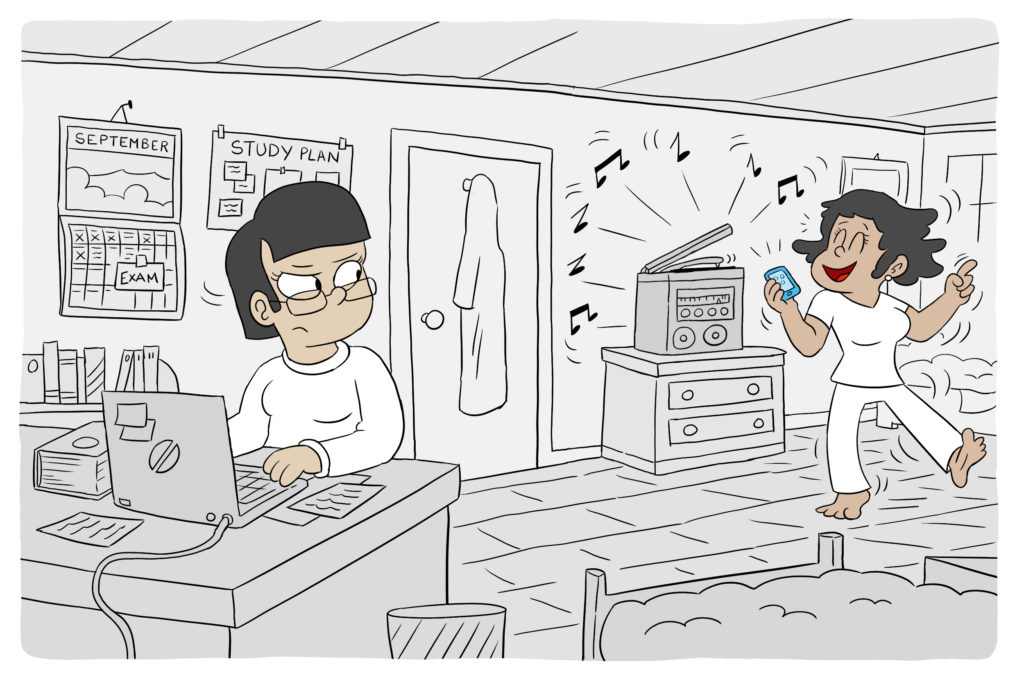It has been three years since Marianne moved from Apeldoorn to Rotterdam. She likes it there. For the past two years, she has rented a room in a small townhouse for students. She lives on the first floor with a roommate, and there are three more floors where six others live. Marianne loves that she has her own quiet space, which makes her feel at home.
At some point, however, Marianne’s roommate found another, larger room in Rotterdam and moved out. Marianne gets a new roommate; from Mexico, her name is Maria. Maria and Marianne got along well at first, but then a problem arose.

Another view
Maria is quite loud and likes to listen to Mexican music. Marianne soon wonders what is wrong with this woman who just moved in with her? “I have to prepare for my exams because I am graduating soon. Now I can hardly concentrate on my studies because of the noise she makes all the time!” She has already tried to talk to her, but Maria doesn’t seem to care!
Maria is unaware of any harm. “Oh, I love Rotterdam! It’s so peaceful, and there are so many places to explore!” At the same time, she misses her home very much, especially her family. Fortunately, there is facetime! She tries to talk to her sister and friends as often as possible, and her parents call regularly. At night, because that’s when they have lunch break in Mexico. And on weekends, it’s totally easy. Actually, they do expect her to call; it was hard enough that they let Maria go. Maria also has double feelings. She wants to build a life of her own and have many friends in Rotterdam, but many people are so on their own! Her roommates, too. So she doesn’t learn Dutch and still falls back on other students from Latin America. And the other students in her house are so easily irritated, including Marianne! “They seem lonely and not happy. I will do my best and turn my music down a bit, but I can’t stop talking to my family and friends.”
The connection
Maria is caught between two worlds. She hasn’t been in Holland long and is still clinging to the “us” feeling she grew up with in Mexico. On the other hand, she also wants to break free from that and build her life in Europe. She has to deal with the strong “me” culture of the Netherlands. To feel at home, Maria listens to her own music and calls Mexico every day. I can imagine that is quite loud for Dutch people. Especially with facetime! Maria is used to a very lively environment with people talking, laughing or arguing, and with music playing all day.
It is not ill will on Mary’s part. Nor is it Marianne’s. They just have a completely different view of being together. Marianne wants to be alone and able to concentrate. People from an “us” society find that they are introverted and fear loneliness. Holland always talks about sociability, but it is not always perceived that way by people from a “we” society. That is why Maria adjusted her behavior only slightly and the problem persisted.
The Netherlands is distinctly individualistic. We pride ourselves on sociability, but on our terms. Moreover, it is a choice to participate or not. In a ‘we’ society, it is also more difficult to withdraw. That is not easily accepted. That social pressure is the flip side of the ‘we’ society.”
Very double all for the housemates. Maria and Marianne must realize that there is a great divide between what they experience as cozy noise. All day music in the common room and conversations with family and friends can be delightful for some and evoke feelings of belonging and happiness. For others, loud music can lead to irritation, loss of concentration or stress.
Explanation
In general, people in Mexico(we-culture) are more involved in each other’s lives. They talk, hug, argue, listen or listen to music together. People in the Netherlands(I culture) are more on their own. Of course they like music! But they choose their own music and often put on headphones.
In addition to the difference in the I and we culture, there is a difference in exuberance a dimension Hofstede calls hedonism. The Mexican of Mary culture is more exuberant. Combined with the we culture a lot of hustle and bustle. At least compared to Marianne’s subdued, more disciplined I culture.
From these cultural differences often comes the most surprise and irritation. Value judgments such as irresponsible, noisy, stressed, boring, lonely and tiring are then quickly made.
Want to read more about culture dimensions?
In short
For Marianne:
- Accept that Mary comes from a we society.
- Your family and large group of friends are very important.
- Time for yourself is not as important as in the Netherlands. Let alone space for yourself.
- Be extra alert to Mary’s body language, which may be concerned about your loneliness and stress, but does not “really” show it.
- Enjoy the enthusiasm, too, but make clear agreements.
For Mary:
- Accept that Marianne comes from an I society.
- Marianne is working on her studies and is not used to crowds in her own room.
- Find a middle ground and ask for clarity.
- Go outside when you call.
- Above all, ask your questions and express your surprise. The Dutch are used to being addressed directly.
Important to know:
This anecdote is based on stories shared with us. Connect2Us strives to highlight the dilemma from both sides and not to label people or suggest that one or the other should behave differently. Awareness by those involved is enough to move toward each other. Without pretending to be very different. Connect2Us wants to help readers recognize and avoid prejudice. Read about prejudice, discrimination and racism here.

